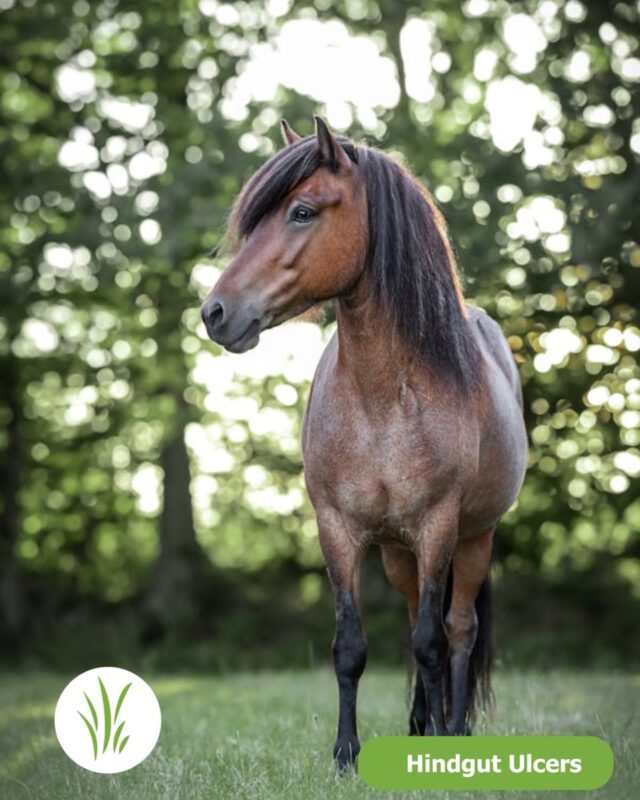HIND GUT ULCERS IN HORSES
What is the Hind Gut?
There are a ranges of causes of hind gut ulcers in Horses. The caecum and the large intestine (colon) of the horse is referred to as the hind gut. It holds a diverse range of micro-organisms i.e. fungi, yeast, parasites, protozoa, archaea, viruses and bacteria. The hind gut acts as a fermenter, using these microorganisms to digest fibrous plant material. Digestion produces energy and nutrients, including volatile fatty acids (VFAs), that the horse can utilise.
To stay healthy the hind gut needs a constant supply of low starch/carbohydrate roughage to
ferment from forage e.g. pasture, hay, haylage and feed. Suitable roughage should always be
available to the horse all year round, even when living out at pasture.
What is Acidosis in the Hind Gut?
Acidosis occurs when something triggers the pH of the hindgut to suddenly lower. These triggers
normally involve the consumption of high starch and sugar foods such as cereals or when pasture
is high in fructans.
The stomach and small intestine can only digest small volumes of food. When large volumes of
starch rich foods are ingested, much of it moves into the hindgut where it is rapidly fermented. The
fermentation causes a rapid rise in in VFAs as well as lactic acid, together quickly lowering the pH.
The amounts of fructans in pasture can vary on a daily basis as well as within seasons. During
Spring pasture lacks fibre and is also high in water soluble carbohydrates such as simple sugars
and fructans, together with starch. Fructans are also high during rainy fall days after hot summer
weather, during cool nights and times when grass is stressed (overgrazing, drought, high salinity in
soil). Fructan level changes with time of day, generally being highest in late afternoon and evening
and lowest in the very early morning hours. They are also high during frosty periods in winter.
Constant changes to the gut pH on a daily and longer term basis causes damage to the intestinal
wall. Acidity causes inflammation and ulceration and high levels of lactic acid:
• Kills off good bacteria – releases toxins via the damaged gut wall into the bloodstream which
may cause laminitis & other health issues
• Changes the microbiome by Increasing levels of bad bacteria such as Lactobacillis sp. &
Streptococcus sp. – involved in laminitis and colic
• Allows harmful viruses or bacteria to survive – cause illness
• Produces higher volumes of lactic acid in the blood – issues with muscle recovery after
exercise, or tying up
As well as forage/food high in starch and carbohydrates, other causes of hind gut acidosis may
include:
• Pain – e.g. dental/musculo-skeletal, hoof imbalance, muscle
• Emotional stress e.g travel, training, competition, stabling
• Ingesting sand
• Chemical wormers
• illness
• Medication
• Intestinal parasites
• Colitis
• Long term use of NSAIDs
Typical symptoms of hind gut inflammation and ulcers include:
• Loss of performance
• Loss of appetite
• Lethargy
• Diarrhoea
• Colic
• Laminitis – mild or acute
• Sensitive flanks
• Prone to illness
We work with many physios, body workers and osteopaths including The Osteopathic Vet. It is important to consider the effects of gut pain on the whole body. Some of the many other symptoms which may indicate gut discomfort may include:
• Hind hooves with consistently long toes and underrun heels – horses placing hooves
underneath the body to try and relieve gut pain.
• Musculoskeletal issues in the spine, neck, hocks
• Poll issues
• Sensitive to touch along the back
• Muscle tightness e.g. glutes & hamstrings
• Lameness
• Sensitivity to rugging, tacking up and brushing
• Bucking
• Disunited
• Spookiness especially when ridden
• Stiffness when ridden
• Not tracking up
• Stepping high with one or both hind legs
• Evading the bridle
• Kicking out against leg aids
Many of these symptoms can also be indicators of other issues so always consult your vet if you
are concerned about your horse’s health.
Take a look at our range of products targeting healthy digestion for horses here
For more information please contact
01432 851111

